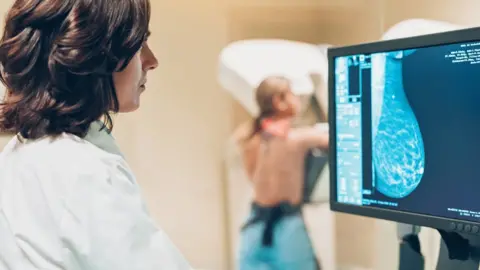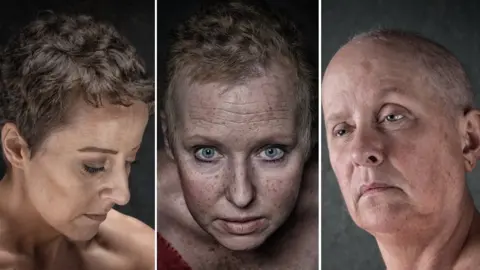Secondary breast cancer: Call for better care in Northern Ireland
 Getty Images
Getty ImagesWomen with secondary breast cancer in Northern Ireland have called for access to the same treatment and drugs available in other parts of the UK.
That is one of the goals included in a manifesto from a group of 16 women calling for improved services.
The women are all living with incurable secondary breast cancer (SBC), also known as metastatic breast cancer.
Patients with SBC in England and Wales are going to be counted in a special audit funded by the NHS.
The women said an audit in Northern Ireland was essential to bring about change and improve services.
Secondary breast cancer is when the cancer has already spread to other parts of the body.
A number of pictures from the exhibition Seen to be Heard are being used at Stormont's long gallery where the women presented their manifesto to MLAs.
 Jennifer Willis/To Be Seen
Jennifer Willis/To Be SeenAs well as having access to drugs and treatment, the manifesto also advocates that women:
- Be included in a clinical audit of secondary breast cancer
- Be supported for assessments and access to clinical trials currently available in the UK
- Have access to the same range of drugs and treatments available in other UK regions
- Have access to specialist nurses with expertise in SBC across all five health care trusts
- Have access to quality, equitable and person-centred care.
While each woman's cancer story is different, a common thread is a hope that they can improve services for those who come behind them.
The group said a special audit of how many people here are living with the disease would provide official statistics required to shape services.
Campaigner Julie Ann Lillis said more information could change women's prognosis from a "death sentence" to a "chronic disease".
Another campaigner, Cheryl Graham, said women with SBC often felt "they aren't important anymore".
Diagnosed 12 years ago with breast cancer, it has now spread to Cheryl's lymph glands, lungs and spine.
Her second diagnosis came on 18 November 2020 - the day her son turned 18.
"I left feeling numb, almost as though I wasn't important anymore," she said.
"But taking part in the photographic exhibition shows I am still here, I am entitled to a life, and I want people to sit up and take notice."
A 'broken' system
Noelle McAlinden has been cancer-free for five years, but has said she was not naïve. She has described the system as "broken".
"Ladies are united with passion and purpose in affecting change in cancer services provision and enquiry for those living with SBC," Noelle said.
The Department of Health has said data collection was a central focus of its 10-year cancer strategy.
However, the women told BBC News NI that they were disappointed their voices were not present in the strategy.
'Truly inspirational'
The women have presented their case to members of Stormont's health committee.
Committee chairman Colm Gildernew said the women's campaign "deserves huge credit and support".
"I met with the women and they are truly inspirational," he said.
He said the workforce crisis in health and social care, including the need to recruit specialist nurses, needed urgently addressed.
Committee deputy chairwoman Pam Cameron described the exhibition as "powerful".
"Through each of the portraits shines the inner strength and human dignity of these woman in the face of heart-breaking personal circumstances," she said.
A Department of Health spokesperson said the health minister is deeply sympathetic and supportive of all those experiencing a cancer diagnosis.
The Health Minister, Robin Swann, has asked officials for an update on the latest position regarding availability of the drug Trodelvy, the statement said.
